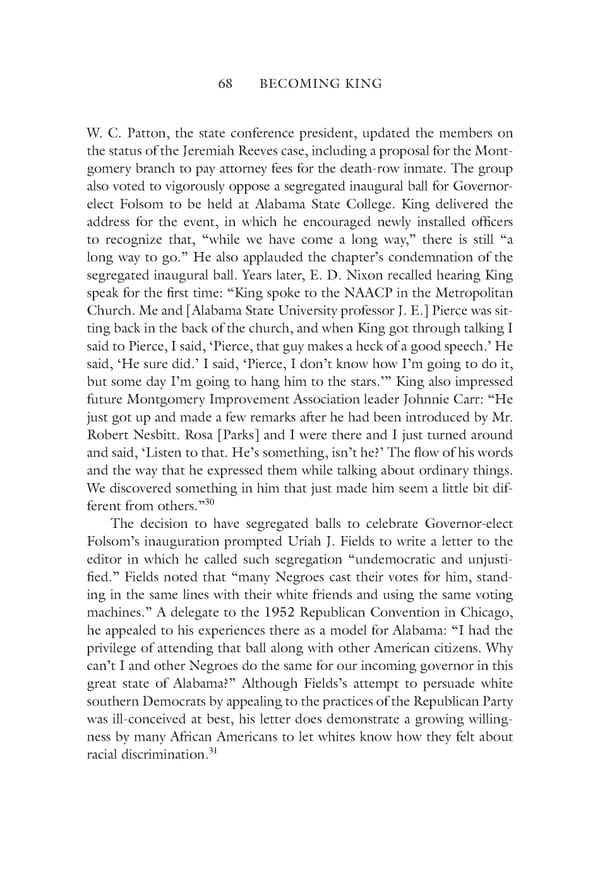68 BECOMING KING W. C. Patton, the state conference president, updated the members on the status of the Jeremiah Reeves case, including a proposal for the Mont- gomery branch to pay attorney fees for the death-row inmate. The group also voted to vigorously oppose a segregated inaugural ball for Governor- elect Folsom to be held at Alabama State College. King delivered the address for the event, in which he encouraged newly installed officers to recognize that, “while we have come a long way,” there is still “a long way to go.” He also applauded the chapter’s condemnation of the segregated inaugural ball. Years later, E. D. Nixon recalled hearing King speak for the first time: “King spoke to the NAACP in the Metropolitan Church. Me and [Alabama State University professor J. E.] Pierce was sit- ting back in the back of the church, and when King got through talking I said to Pierce, I said, ‘Pierce, that guy makes a heck of a good speech.’ He said, ‘He sure did.’ I said, ‘Pierce, I don’t know how I’m going to do it, but some day I’m going to hang him to the stars.’” King also impressed future Montgomery Improvement Association leader Johnnie Carr: “He just got up and made a few remarks after he had been introduced by Mr. Robert Nesbitt. Rosa [Parks] and I were there and I just turned around and said, ‘Listen to that. He’s something, isn’t he?’ The flow of his words and the way that he expressed them while talking about ordinary things. We discovered something in him that just made him seem a little bit dif- ferent from others.”30 The decision to have segregated balls to celebrate Governor-elect Folsom’s inauguration prompted Uriah J. Fields to write a letter to the editor in which he called such segregation “undemocratic and unjusti- fied.” Fields noted that “many Negroes cast their votes for him, stand- ing in the same lines with their white friends and using the same voting machines.” A delegate to the 1952 Republican Convention in Chicago, he appealed to his experiences there as a model for Alabama: “I had the privilege of attending that ball along with other American citizens. Why can’t I and other Negroes do the same for our incoming governor in this great state of Alabama?” Although Fields’s attempt to persuade white southern Democrats by appealing to the practices of the Republican Party was ill-conceived at best, his letter does demonstrate a growing willing- ness by many African Americans to let whites know how they felt about 31 racial discrimination.
 Becoming King: Martin Luther King Jr. Page 88 Page 90
Becoming King: Martin Luther King Jr. Page 88 Page 90